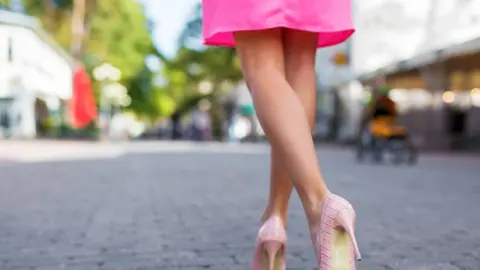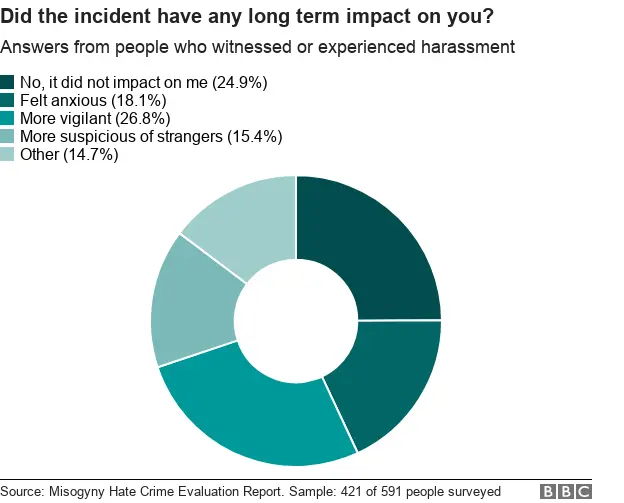Misogyny hate crime in Nottinghamshire gives 'shocking' results
Misogyny and offences targeting women are still "highly prevalent" two years after a police force started treating them as hate crime, academics say.
The "misogyny hate crime policy" has been piloted by Nottinghamshire Police.
The force records misogynistic behaviour as either hate crime or hate incidents, depending on whether or not the behaviour is criminal.
But university researchers were "shocked" by the volume and nature of the incidents among people surveyed.
However, they found the policy is already "shifting attitudes".
 Getty Creative
Getty CreativeDr Loretta Trickett said: "Much of this behaviour on this spectrum is criminal behaviour, there's no doubt about that. People could have gone to the police about it before.
"But because of the culture we have it's just acceptable to intimidate women on the street, to go up to a woman and touch her backside, or to comment on her body and put her in fear of an assault."
Professor Louise Mullany said: "There's a spectrum of crime here, and it goes up to rape and sexual assault, and we were really shocked at how high the figures were in terms of people reporting the more serious end of crime, and that becoming part of a regular occurrence."
The Misogyny Hate Crime Evaluation report was put together jointly by the University of Nottingham and Nottingham Trent University.
It recommends rolling the policy out nationally to increase publicity and the reporting of incidents.
This view is shared by Paddy Tipping, Nottinghamshire's police and crime commissioner, who said: "A handful of other forces have come forward and later on this week all the chief constables in the country are going to discuss the issue.
"We all need to be pushing together to say we are not going to tolerate this kind of behaviour.
"The report has come out at a really good time, a couple of days before all the chief constables have this discussion, and I think there's a lot of support for it."
What is misogyny hate crime?
 Getty Images
Getty ImagesMisogyny hate crime is defined as "incidents against women that are motivated by the attitude of men towards women and includes behaviour targeted at women by men simply because they are women".
Examples include sexual assault, which had been experienced by 24.7% of survey respondents, indecent exposure (25.9%), groping (46.2%), taking unwanted photographs on mobiles (17.3%), upskirting (6.8%), online abuse (21.7%), being followed home (25.2%), whistling (62.9%), sexually explicit language (54.3%), threatening/aggressive/intimidating behaviour (51.8%), and unwanted sexual advances (48.9%).
However, not all hate crimes are criminal offences according to the legal definition.
Does the policy criminalise wolf whistling?
 Getty Images
Getty ImagesNo. The research showed the policy had been misinterpreted and "trivialised" in media reports, which had focused on wolf whistling and suggested this was now illegal.
However, the policy does not criminalise anything that was previously legal, and anything criminal is covered by existing legislation.
For example, a sexual assault against a woman is still a sexual assault but is now recorded as a hate crime too. Wolf whistling would be recorded as a hate incident.
There were 174 reports by women between April 2016 and March 2018. Of these, 73 were classified as crimes and 101 were classified as incidents.
Police will start an investigation and women will be offered support whether or not the behaviour is criminal. For example, police have spoken to building site managers after women complained of being harassed by builders.
What effect does misogyny hate crime have?

Three quarters of all victims (74.9%) who responded to a survey said there had been a long term impact.
The researchers also interviewed four of the women who had reported misogyny hate crime.
One woman experienced two men in a van pulling over and shouting at her to get in while she was walking to work through an industrial estate.
She said: "It was leery, yeah, it wasn't explicit sexual language used but the whole experience was really intimidating."
Another woman had her bottom grabbed while she was running down the street and said it had frightened her, stopped her from going out at certain times and made her "nervy".
The third woman was shouted at four or five times while out running, including something sexual by a workman in a van, which she found "demeaning".
The fourth woman was called "a slut" and told she "wanted it" by a man on the tram, which had made her "definitely more cautious".

Follow BBC East Midlands on Facebook, on Twitter, or on Instagram. Send your story ideas to [email protected].
